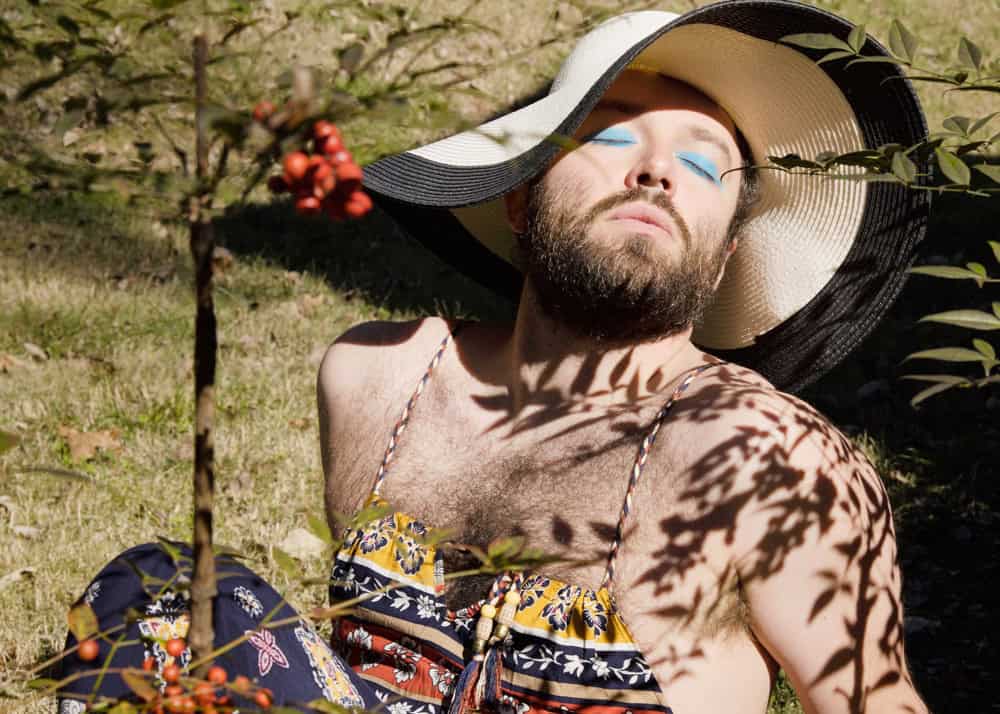Country Sundaes: Gender-bent Country Queen Classics
By Christopher Treacy

Max Nunes loves a good banana split.
He also loves a great country song. His Nashville-based band, Sundaes, recently put together a spinoff project called Country Sundaes, a short film in which Nunes sings classic tunes by Kitty Wells, Patsy Cline, Loretta Lynn, and Dolly Parton. A slowed version of Kacey Musgraves’s “Space Cowboy” keeps the set anchored in the present while paying tribute to the past. With old-timey television footage woven throughout, Nunes is refreshingly natural as he delivers five tales of honky-tonk heartbreak all made famous by women.
As the songs are established in our collective consciousness as those of famous women in country music, Country Sundaes raises some compelling questions about the gender of art. Sure, in the most technical sense, words have gender. But as words artfully arranged, do songs carry gender? And if so, is the gender of a song determined by its wording? By the writer? By the vocalist? By the listener? Is it a collective perception?
This gets tricky. Making matters more intriguing, two of the songs in question were written by men specifically for a woman to sing.
Maybe what matters is our awareness that the gender of art is fluid, much like the emotion it conveys.
“It’s easy to think of me inhabiting a so-called woman’s perspective in a song as a queer act, but I think at their core, these songs are really about being in love with someone who isn’t good to you, and not being able to help yourself,” Nunes told us. “It’s a fundamentally human experience, affecting people all across the gender spectrum. That feeling of not being able to stop loving somebody, even though they hurt you, really resonates with me as a singer.”
Nunes’s original material tends to occupy a similar space, pushing him further out on a limb as he explores the dark emotional terrain of queer broken-heartedness. Musically, Sundaes have dabbled in both electronica and acoustic singer-songwriter fare, always returning to a home base of reverb-heavy dream-pop, And Nunes has played with gender from the get-go, using video as a powerful tool to fortify our perceptions of his songs with visual curveballs. In “Talking,” he initially appears with a bushy beard and full head of hair; by the video’s end it’s all been shaved off and makeup has been applied. It’s strikingly transformative. For “Pretty Wife,” he’s in a pink leotard and tutu, but his beard stubble establishes him as a decidedly male figure.
For Country Sundaes, he lets the songs do most of the heavy lifting. Nunes appears in a blue mechanic’s jumper with some chest hair spilling out the top. A brooch and his signature pink cowboy hat provide visual counterweights.
“In old country music—and really a lot of old music—the feminine viewpoint seems to be defined by a struggle to carve out identity in the face of second-class citizenship behind men,” he said. “I can really feel the strain, the weight, of that fight when I listen to great female vocalists sing their blues. I think maybe as a queer person I gravitate toward the sound of struggle for identity.”
Country Sundaes seems to have left a permanent stamp on Nunes’s music. For the just-released Sundaes EP, boys who made me cry, pedal steel adds a classic, western humidity to each of the five tracks, from the melancholic title song to the horn-spiked, a long kiss goodbye, which projects a more buoyant tone.
He says he will likely release more cross-gender covers in the future, but he’s wary of letting anything outside the music define what he’s doing with it.
“When Dolly Parton wrote ‘I Will Always Love You,’ and left Porter Wagoner’s show, she was trying to define herself outside a male context,” he said. “She didn’t want to be just somebody’s girl singer. I really feel that. I don’t want to be anybody’s queer singer. I want to be able to proudly convey what would historically be contextualized as queer themes in my music, and just be considered a human singer. I guess inhabiting the ‘women’s perspective’ is an attempt to push toward normalizing that.”
Christopher Treacy has been writing about music and the music industry for 20 years. He’s written for The Boston Phoenix, The Boston Herald, Nashville Scene, and Berklee College of Music’s quarterly journal, as well as myriad LGBT outlets including the Edge Media Network, Between the Lines/Pride Source, Bay Windows and In Newsweekly. He lives in Buffalo, NY.